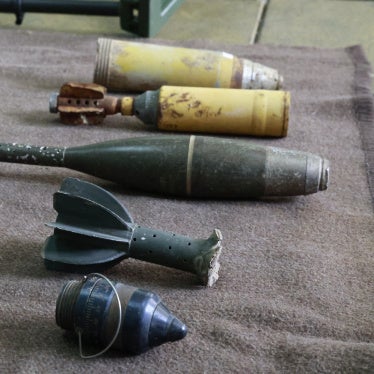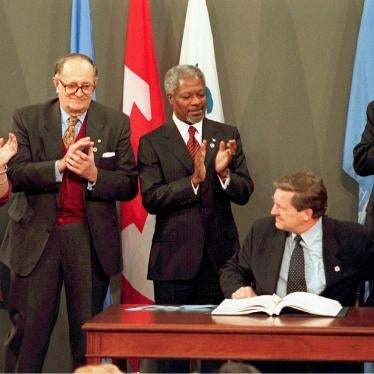Thank you Madame President, thank you very much for giving us the floor; that routine gesture takes on additional meaning this week. We would like to comment on four things.
First, improvised explosive devices, or IEDs. There has already been a good deal of discussion on IEDs today and this week. We would like to remind delegates, to emphasize to delegates, that the use, production, trade, and stockpiling of victim-activated IEDs is already prohibited by the 1997 Mine Ban Treaty. Any IED that explodes from the presence, proximity, or contact of a person is banned under that treaty. That includes IEDs with tripwires, and IEDs with pressure plates that are activated by the weight of a person; many of the IEDs in Afghanistan that have been widely discussed here fall into that category. The comprehensive ban on victim-activated IEDs is the standard to which all governments and non-state armed groups should be held.
Second, transparency. Earlier this year, two CCW States Parties made important announcements regarding their antipersonnel mine stockpiles, at the 3rd Review Conference of the Mine Ban Treaty in Maputo, Mozambique in June. China revealed that its stockpile now numbers less than 5 million. Previously, China’s stockpile was estimated at more than 100 million. The United States, as part of a new landmine policy announcement, stated that its stockpile is now about 3 million. Previously, the Pentagon had reported a stock of more than 10 million. We were very pleased to receive this information and these important transparency measures. We encourage other CCW States Parties to show similar transparency regarding their stocks. We especially urge this of the three CCW States Parties that now apparently hold the three largest stocks in the world: Russia with an estimated 26 million; Pakistan with an estimated 6 million, and India with an estimated 5 million.
Third, the new US policies we heard reiterated earlier this afternoon. We warmly welcome the new US policies, which are important steps toward a comprehensive ban on antipersonnel mines and toward joining the Mine Ban Treaty. We of course urge the US to go farther, and to remove the Korea exception as soon as possible. But we hope that the new US policies will encourage other CCW States Parties to formally end production and acquisition of antipersonnel mines, and to accelerate stockpile destruction. We also hope the new US policies will encourage other CCW States Parties to move toward accession to the Mine Ban Treaty more rapidly.
Fourth, the ICBL Completion Challenge. Prior to the 3rd Review Conference of the Mine Ban Treaty in June, the ICBL issued a “Completion Challenge” to States Parties, calling on them to commit to finishing all major treaty obligations within a decade, including clearance of all contaminated land. As we heard from the Dutch Ambassador earlier, States Parties rose to the challenge and have set 2025 as the goal to have cleared all mined areas. It is realistic for CCW States Parties to also meet this challenge and we urge them to do so.
Finally, Madame President, we must close by strongly objecting to the efforts of one or two CCW States Parties to silence the voice of one of our colleague NGOs, Geneva Call. We find such efforts wholly inappropriate; we find such efforts counter to the open, mutually-beneficial working relationship established between States Parties and civil society in the CCW over the past two decades; and we find such efforts as counter to the effectiveness of the CCW itself.
Thank you.








